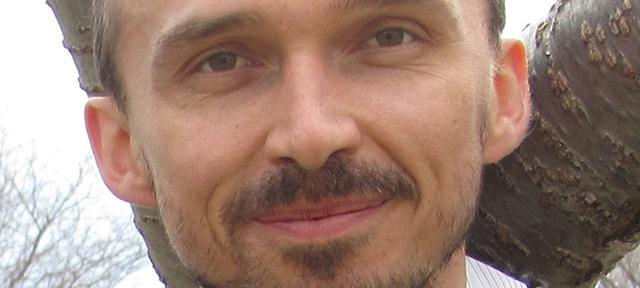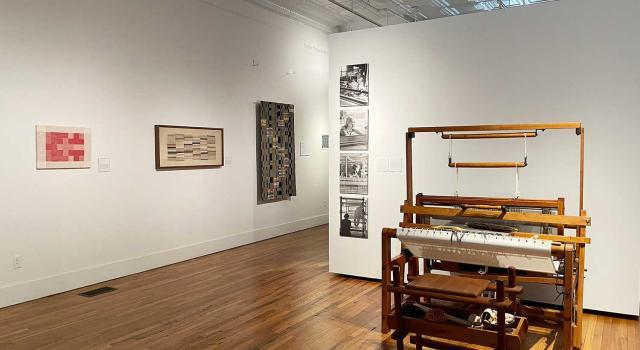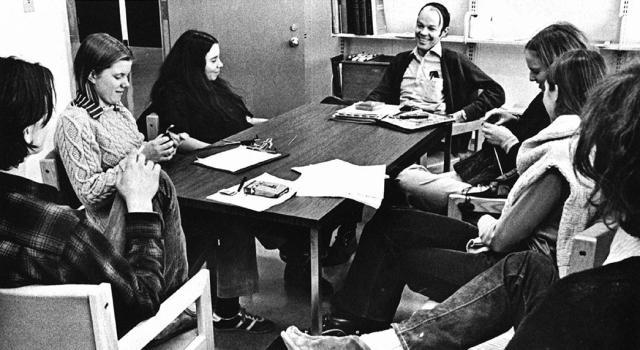Q&A Interview with Asian Religions Professor Rafal Stepien

Fourth-year Hampshire student Emily Lawson gets to know newly appointed faculty member Rafal Stepien.
Emily: I’d love to hear what projects you’re working on right now.
Rafal: Next month I’m giving a talk at the American Academy of Religion annual meeting, where I’ll actually be voicing a slight disagreement with your adviser, Jay Garfield. I’ve also got articles on Rumi, Nāgārjuna, and a comparative piece on Chinese Buddhist and Persian Islamic poetry that have been accepted for publication but need revision.
I just put together a seminar at the annual meeting of the American Comparative Literature Association, which is going to be held at Harvard in March. The seminar will be on ‘Buddhist Literature as Philosophy, Buddhist Philosophy as Literature, and I’ll be reading Chan Buddhist philosophy of language through Chinese Buddhist literary theory. It’s exciting, because philosophers and literary critics tend not to speak to one another.
Emily: That’s fascinating. I’ve studied Buddhist philosophy, but where can I read about Buddhist literary theory?
Rafal: The major text I’m using is called The Literary Mind and the Carving of Dragons. That’s how it’s usually translated. There’s a lot of Chan—Chinese—thought on what texts, literary or otherwise, do – which is slightly paradoxical given that Chan takes itself to be ‘beyond words and letters’.
Emily: Thanks so much. While I’m asking for book recommendations, can you name some of the books that changed your life?
Rafal: Well, I can list seven authors who changed my life. The Buddha comes to mind. Rumi led me to go to Iran to study Persian. I also have to name Dante, for whom I went to Bologna to study Italian. Laozi, the presumed author of the Dao De Jing, for whom I studied Chinese in China, and at Oxford. When I read the Dao De Jing in Chinese, I remember closing that book and thinking, “What had to be done has been done” – to adapt a stock Buddhist saying. Ibn al-‘Arabi is the single greatest reason for my studying Arabic. T. S. Eliot introduced me to the beauties of the English language. Nāgārjuna is pretty amazing. I studied Sanskrit and wrote a chunk of my PhD on him. I’m probably going to be grappling with the ideas that he and these other authors raise for the rest of my life. Others keep crowding to mind.
Emily: As a message to young scholars in your discipline, like me: what’s a topic that still needs to be explored?
Rafal: It’s not the case that no one’s paying attention to this, but I think a great deal more attention needs to be paid to the theoretical and methodological assumptions underlying Western lenses of viewing “Eastern,” typically Asian, thoughts, philosophies, religions, practices, texts, etc. I feel that we typically still are “Orientalist,” in a word. We invoke “our” ways of viewing things. The question, for example, of whether Buddhism is a philosophy or a religion makes no sense from a Buddhist perspective. Regardless of our background or backgrounds, we should all try to absent ourselves to the extent possible from our work so as to let the texts speak with their own voices, not ours. Getting away from these Eurocentric, Occidento-centric modes of thinking needs to happen a lot more rigorously.
Emily: Especially in philosophy.
Rafal: So many philosophers just don’t treat anything east of Athens as philosophy.
Emily: It’s so strange to me. I went to a seminar in philosophy this summer in Colorado, and I went in thinking everyone else would also be invested in the de-Eurocentralization of philosophy, because even their own departments didn’t offer courses on non-Western philosophy. So I was floored when some of these other philosophy students responded to me like: “What are you doing? No—philosophy started in Greece. Analytic philosophy started with Kripke and Frege.” I couldn’t believe it. I guess that coming from Hampshire, I was so used to a culture of challenging assumptions and bending disciplines that I didn’t see it coming.
Rafal: The blindness is just blinding.
Emily: When you were a college freshman, what did you think you’d be doing right now? What did you start out studying?
Rafal: I suppose I’ve always been interested in ideas and their expression in language: so English and philosophy. Even at that age, I knew that I was going to write, and indeed to this day—except for a certain munchkin I have (my one-and-a-half-year-old son, my beloved, my nemesis)—I’m still writing poetry. Well, nominally I’m still writing. Actually I haven’t written a word since he was born.
Emily: Wow. You’re actually doing what you always imagined. How does someone get to that place from where I am? Broadly, what words of advice do you have for undergraduate students?
Rafal: I feel uneasy giving advice, but if I’m put on the spot, I’d encourage you to be courageous about the choices you’re making. You get four years—especially at Hampshire—to learn about anything you want to learn about, especially because you have no fixed requirements. You have the whole Five College system here to benefit from. You’re probably never going to get this kind of chance again, so just immerse yourself in it.
Emily: Noted! Okay. Here’s my favorite question: What were you like when you were ten?
Rafal: On my tenth birthday, I think I was a very different person from who I was on my eleventh birthday. My parents split up that year, and ended up speaking very badly about each other to me for a long time thereafter. I had to learn never to accept the word of any kind of authority just because of their authority, and to delve into questions myself. I learned independence of mind.
Emily: That’s a great answer. Here’s something lighter. What is your nonacademic alter ego doing right now?
Rafal: Writing poetry! Realistically, he’s probably trying to stop [my son] from, say, eating the lamp. But the nonacademic alter ego I would most like is writing poetry.
Emily: If you could teach a whimsical class on anything you could think of, what would the course title be?
Rafal: The Buddhism of Buffy or, maybe, The Dao of Federer.
Emily: As in Buffy the Vampire Slayer?
Rafal: It’s one of the greatest shows ever.
Emily: Maybe I’ll have time to watch it after I graduate! Can you tell me a fun fact about you?
Rafal: As a kid, I would often let my imaginary friends beat me at games.
Emily: One last question. What excites you about Hampshire?
Rafal: Hampshire students are truly independent, so I’m excited by the fact that they choose to take my classes rather than being forced to take them to fulfill requirements. They do the readings, they come with questions, they’re very engaged. And there’s no pretense. There’s no arrogance. There’s no sense of superiority or anything like that . . . which I’ve gotten with students elsewhere, in places that shall remain unnamed!



